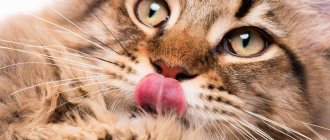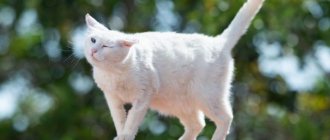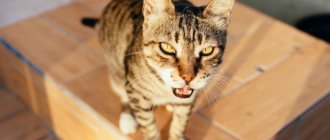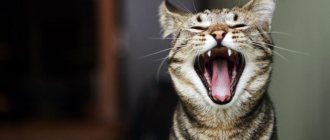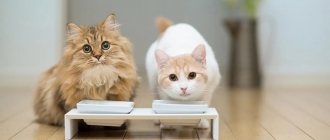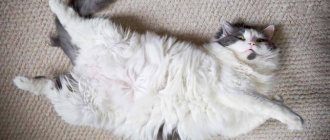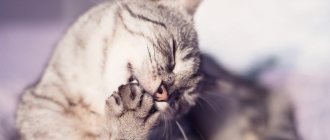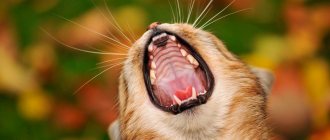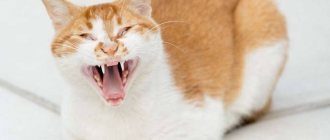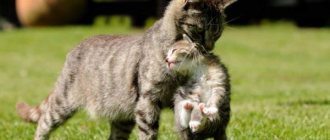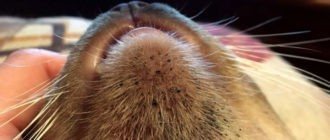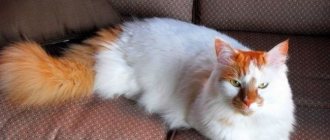10504Administration
Experienced furry pet breeders know how much their pet will eat in one meal. You should not give your furry pet too much food or gradually increase the usual portion. Of course, this does not apply to a small kitten, which is constantly growing and developing. This also does not apply to pregnant and lactating individuals, who need adequate nutrition for the healthy growth of future kittens.
But if it happens that a mature individual constantly wants more after eating, this phenomenon is not considered the norm. Why does my cat constantly ask for food? You will find the answer to this question in our article.
Normal feeding frequency and portion sizes
The pet's diet includes store-bought dry or wet food, as well as natural food. The serving size depends on the age of the pets and their activity.
For kittens
Kittens need to eat frequently for normal growth and development. However, the volume of the portion received should be small so that the baby has time to digest the food received.
An excess of food or, conversely, a lack of it leads to disturbances in the formation of the body. Digestive disorders, obesity or nutritional deficiencies may occur. The frequency of feeding a kitten depends on its age. At the beginning of complementary feeding - 5 times, gradually the owner should reduce the frequency of feedings to 2-3 times by 6 months.
The volume of the daily portion of dry food depends on the age of the baby. So, at the age of 1-2 months, it will be enough for a pet to eat from 30 to 50 g of store-bought food per day. From 2 to 4 months, the kitten is given 40-65 g, from 4 to 6 months - 55-70 g. From six months of age, the norm of dry food reaches 60-80 g.
Wet food is also introduced gradually, starting complementary feeding with 120 g per day. Gradually, the volume of canned food or natural food is increased to 250 g by 6 months.
For adults and active animals
Food helps adults stay active and energetic. A properly selected diet should contain the right amount of animal protein, vitamins and microelements.
An adult cat is fed no more than 2-3 times a day. The amount of food depends on the weight of the pet. Dry food is given at the rate of 12-15 g per 1 kg of cat weight. So, a mustache with a body weight of 3 kg should receive about 45 g of “drying”.
Wet food and canned food are given in a volume of 60-70 g per 1 kg of weight, or 5% of the total weight of the animal. The serving size for a 3 kg cat will be 180-210 g.
Natural food for active adult fluffies should consist of meat, cereals, vegetables and dairy products. The main part of the diet is meat and offal. The animal needs to eat up to 30 g of protein products per 1 kg of weight per day. The daily intake of cereals is about 15 g, vegetables – 10 g, fermented milk products – 20 g.
For older people
The nutrition of older cats should support the normal functioning of all organs and systems and not cause digestive disorders. The menu should contain easily digestible food appropriate to the age of the individual.
In terms of the frequency and volume of portions, the diet of an elderly mustache does not differ from that consumed in an active age. If the cat is obese, the daily portion can be reduced by 10-15%.
What is this phenomenon?
If a cat constantly asks for food, then this change in eating behavior is called polyphagia. This is a pathological condition caused by:
- gluttony and stretching of the stomach walls;
- lack of nutrients during the active growth of a young animal;
- the body's reaction to medications;
- stress or prolonged feeling of discomfort;
- cold season;
- decreased metabolism in old age.
- I want to eat.
Polyphagia can develop at any age. If your cat has been eating a lot lately, although this was unusual for him before, the reason should be identified as soon as possible.
Attention! Stressful situations and prolonged lack of appetite subsequently provoke polyphagia in cats.
After a hunger strike, they try to make up for the lack of nutrients without feeling full.
Why does a cat constantly eat, but does not get enough and even loses weight: physiological reasons
There are times when a cat asks to eat even after it has received the required amount. Increased appetite becomes a signal for the owner - it is worth paying attention to the health of the pet and finding out the possible reasons. Sometimes this will require a visit to the veterinarian.
Worm infestation
Worms have an extremely negative effect on the body of the mustache. The cat begins to lose weight, although the amount of food he consumes increases. Weight loss, nausea, vomiting, diarrhea or constipation are the main symptoms of helminthic infestation.
In addition, the infected individual develops food preferences that are unusual for it. In general, the condition of the furry friend is depressed and lethargic. In advanced cases, helminths are visible in the vomit and feces. Antiparasitic drugs prescribed by a veterinarian can help a suffering cat who is constantly hungry.
Problem with nutrient absorption
The furry glutton has difficulty absorbing nutrients. Because of this, the mustache feels hungry and asks for food too often. Absorption disorders are symptoms of a serious pathology. These include malignant neoplasms and problems with the pancreas.
Hormonal disorders
Disturbances in the production of hormones lead to the fact that the cat constantly asks for food. Problems in the functioning of the endocrine system cause the development of diabetes, kidney failure, hypothyroidism and other ailments. In addition to a strong desire to often approach the bowls for food, sick individuals exhibit a strong thirst.
Only a veterinarian can diagnose disorders. He also prescribes appropriate treatment to maintain normal condition.
Starvation, exhaustion or insufficient portion size
Increased appetite in pets is a consequence of forced starvation or exhaustion. Some veterinary procedures require the animal to fast for long periods of time. And sometimes the animal gets lost and spends a long time without food.
A hungry person pounces on food and asks for more even after feeding. In this case, overeating, which is bad for digestion, should not be allowed. Portions should be small, but an exhausted mustache should be fed frequently.
Pregnancy in females
All pregnant individuals eat a lot, going to the bowls even after feeding. During this period, a lot of nutrients and vitamins are required for the normal gestation and development of newborns in the womb of the cat mother.
If a pregnant cat is constantly hungry, then her menu should be changed. High-calorie dishes enriched with vitamins and microelements are suitable for feeding. It is not recommended to overfeed the expectant mother, so as not to cause complications during childbirth.
Extreme cold
On cold days, the mustachioed friend's body spends more energy to heat itself. To replenish energy loss, the animal needs more food. During the winter and autumn, the owner should increase the serving size and increase the nutritional value of the dish - then the mustache will not often look into the bowl.
Taking medications to suppress hunger
Medicines prescribed to treat various diseases provoke too much appetite in your pet. This is how enzyme, anticonvulsant and hormonal medications act on your furry friend. Increased hunger is a side effect of medications.
Diabetes
In diabetes mellitus, nutrients are not absorbed in the body, which causes energy deficiency.
Particular attention should be paid to such a disease as diabetes.
The disease is characterized by the development of metabolic pathologies that provoke absolute or relative insulin deficiency. As a result of such a disease, metabolic processes of all systems are disrupted. There is a failure of carbohydrate, fat, protein, mineral and water-salt balance.
Despite the efforts of the owners and the good diet of the animal, nutrients cannot be absorbed into the body
, since a lack of glucose provokes a shortage of energy for this process. And glucose itself is absorbed only with insulin, which is not enough as a result of a failure of metabolic processes.
Symptoms
One of the symptoms of diabetes is constant thirst.
The main accompanying symptoms of diabetes include: obesity, increased thirst.
- With excessive appetite, the pet sharply loses weight, and the amount of urine output increases.
- Peripheral neuropathy manifests itself - the animal walks, leaning on the entire foot, the gait is uncertain, unsteady.
- The cat becomes weak, lethargic, and reluctant to make contact.
- The smell of acetone is felt from the oral cavity, the skin becomes thinner, the coat is disheveled, dull, a sickly appearance and a dull look.
Treatment
Therapeutic measures consist primarily of a properly selected low-carbohydrate diet.
A properly selected diet is the key to successful treatment of a cat.
If diabetes is suspected, the owner can independently check the sugar level. To do this, you will need to conduct a test using special urine strips. It is also possible to use a veterinary glucose meter to check your blood sugar levels. The physiological indicator of sugar in the urine is its absence. In the blood – from 3.3 to 6 mmol/l
.
Why does my cat always ask for food even though he's not hungry?
The desire to snack in individuals of any age is caused by both physiological and psychological reasons. They cannot be ignored, because in advanced cases they lead to the development of chronic nervous conditions.
Competition for food with other pets
Living in the same house with other pets makes you want to be first at the food bowl. Even a mustache that has eaten a hearty meal will not want to give the food left on the plate to its relative. The greedy person will try to be the first to be at the feeder and quickly eat not only her own, but also someone else’s portion.
Eating stress
False hunger is a sign of psychogenic polyphagia, which occurs against the background of eating disorders. An excessive increase in appetite develops due to severe emotional shock. Stress is provoked by various reasons: long separation from the owner, a trip to the veterinarian, change of place of residence.
Lack of attention
Fluffy pets really need care and affection from their adored owner. If the owner ignores the pet’s desire to take him on his lap and caress him, then sooner or later the animal will begin to suffer from lack of attention. Your furry friend will be worried and bored.
To attract the attention of a person, the cat will begin to constantly ask for food. This is not only an opportunity for him to attract the owner, but also a way to cope with stress.
Fear of hunger in street animals
Homeless mustaches survive in very difficult conditions, so they are always in search of food. Even when they find themselves in a family of loving owners, former street animals do not immediately get rid of old habits.
Cats are afraid of hunger, so they too often go to the bowl of food and wait for more - so that they can eat for the future. Individual comrades can stock up by hiding food in different parts of the house.
In what cases should you contact a veterinarian?
There are situations when the owner should not hesitate to visit the veterinary clinic. Sometimes a cat constantly asks for food because it is suffering from serious illnesses, and hunger is just one of the symptoms. Other warning signs include:
- vomit;
- temperature increase;
- digestive disorders;
- weight loss;
- apathetic state;
- dulling of fur;
- discharge from the eyes or nose.
A sick pet often seeks solitude and tries to dodge the caresses of its owner. Sometimes a suffering mustachioer cannot stand being in bright rooms, trying to crawl under a table or bed. Such signs, along with a feeling of excessive hunger, are symptoms of health problems.
How to keep your pet's weight within normal limits
A veterinarian will help you find out the nutritional norm. In addition, approximate daily allowances for mustaches of different ages and different body weights are indicated on food packages.
Should I limit the amount of food I eat?
Restrictions on the amount of food will only help those pets who suffer from excess weight or food allergies. A special diet is provided for such cats. By adhering to a certain regime, the glutton will restore normal body weight and will be able to lead an active lifestyle. In other cases, restrictions on the volume and frequency of feeding are not correct.
How to tell if your cat is malnourished or obese
An attentive and caring owner always sees when something happens to his pet. Problems with underweight or excess body weight are very visible. Obesity is characterized by low activity, the appearance of fatty deposits and folds. Thinness is noticeable through too sunken sides and a protruding spine.
The owner’s main task is to find out the cause of the pet’s painful condition. It is impossible to do this on your own. Only a veterinarian can make a diagnosis and prescribe treatment.
Maintaining a normal psychological state
The best cure for any stress and neurosis in a furry friend is care, affection and attention from a person. Love works wonders, so a simple stroke will help distract the cat from adversity.
The mustache will not have to eat stress if the owner plays with it or picks it up. You should not leave your furry friend alone for a long time, so as not to provoke negative changes in the psyche.
To prevent your furry pet from being too intrusive in its desire to feed itself beyond the norm, you need to pay enough attention to it, look after it, and monitor its diet. We must not forget about regular visits to the veterinarian, quarterly deworming and annual vaccinations.
A physically and mentally healthy cat or cat will not constantly ask to eat and sit near the bowl. A balanced menu will provide enough strength and energy for an active life. If alarming symptoms are detected, you should contact your veterinarian.
The article is of a recommendatory nature. Contact a specialist!
Reasons for cat night concerts
Why does a cat meow for no reason at night? This often occurs in animals during estrus. Continuous screams at night may also indicate illness.
However, most often a cat screams at night because it cannot sleep. It is possible that her sleep-wake pattern is disrupted. Night meowing greatly disturbs the peace of the owners. In this case, you need to make sure that the cat sleeps as little as possible during the daytime. It is also useful to arrange active games with the animal more often during the day. This will ensure your pet sleeps soundly at night.
